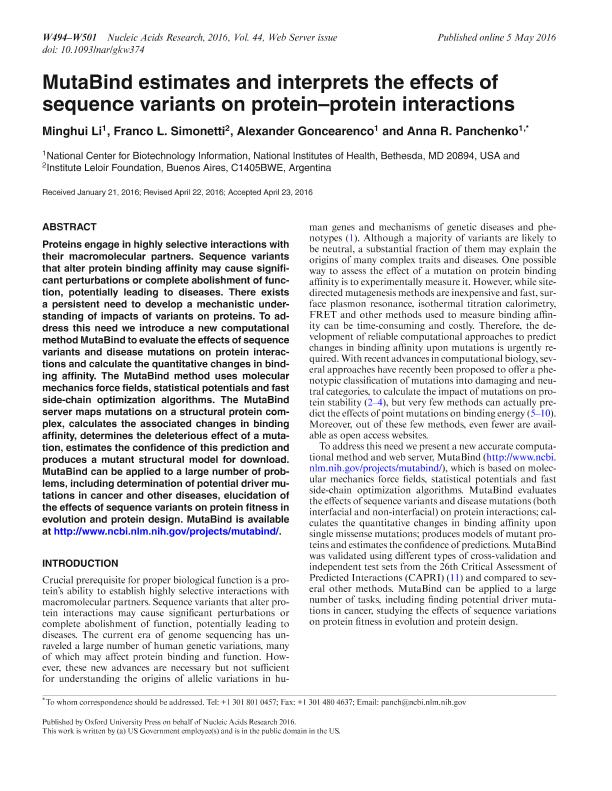Artículo
MutaBind estimates and interprets the effects of sequence variants on protein-protein interactions
Fecha de publicación:
05/2016
Editorial:
Oxford University Press
Revista:
Nucleic Acids Research
ISSN:
0305-1048
e-ISSN:
1362-4962
Idioma:
Inglés
Tipo de recurso:
Artículo publicado
Clasificación temática:
Resumen
Proteins engage in highly selective interactions with their macromolecular partners. Sequence variants that alter protein binding affinity may cause significant perturbations or complete abolishment of function, potentially leading to diseases. There exists a persistent need to develop a mechanistic understanding of impacts of variants on proteins. To address this need we introduce a new computational method MutaBind to evaluate the effects of sequence variants and disease mutations on protein interactions and calculate the quantitative changes in binding affinity. The MutaBind method uses molecular mechanics force fields, statistical potentials and fast side-chain optimization algorithms. The MutaBind server maps mutations on a structural protein complex, calculates the associated changes in binding affinity, determines the deleterious effect of a mutation, estimates the confidence of this prediction and produces a mutant structural model for download. MutaBind can be applied to a large number of problems, including determination of potential driver mutations in cancer and other diseases, elucidation of the effects of sequence variants on protein fitness in evolution and protein design. MutaBind is available at http://www.ncbi.nlm.nih.gov/projects/mutabind/.
Palabras clave:
Protein Protein Interaction
,
Mutation
,
Sequence Variants
,
Server
Archivos asociados
Licencia
Identificadores
Colecciones
Articulos(IIBBA)
Articulos de INST.DE INVEST.BIOQUIMICAS DE BS.AS(I)
Articulos de INST.DE INVEST.BIOQUIMICAS DE BS.AS(I)
Citación
Li, Minghui; Simonetti, Franco Lucio; Goncearenco, Alexander; Panchenko, Anna R.; MutaBind estimates and interprets the effects of sequence variants on protein-protein interactions; Oxford University Press; Nucleic Acids Research; 44; W1; 5-2016; W494-501
Compartir
Altmétricas




